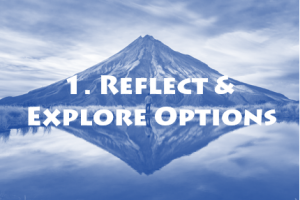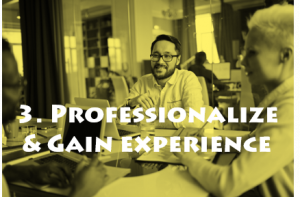Having the skills and confidence to navigate all aspects of your job search successfully is essential for your career development. Career Services is here to support you throughout this process, from helping you present yourself well both on paper and in person to potential employers to equipping you with the knowledge and strategies to help you land your job offer.
Preparing for Careers Beyond Academia
Career Services can help you navigate the timeline and process of seeking jobs in a diversity of fields. We’re here to help you translate and communicate the skills and experiences you’ve gained in graduate school as you demonstrate your fit for different roles, organizations, and industries. We can guide you through the application, interviewing, and negotiation phases to help you successfully land a job in a career field that interests you. Make an appointment with a Career Advisor via Handshake at any stage of your process.
Timeline for Applying
Unlike academic searches and searches in certain industries like consulting that are cyclical and usually begin a year before a new hire starts, the search process often ranges from a few to several months as opposed to a full year. This is because when positions open up, it’s often because someone is departing the role, and the employer needs to have someone else in the position as soon as possible to do the job. Sometimes, when a position is newly created or when the employer has leeway to wait for the ideal candidate, the search process can take longer than usual. However, it’s safe to say that if you are looking to apply for jobs beyond academia, it’s often helpful to start actively searching and applying for jobs at least six months in advance of when you’d like to be employed. In the last year before you graduate from Penn, you will be involved in all aspects of your job search, but the stage of actively applying will primarily be in the last six months. If you have flexibility in the timing of completing your degree or program, you may consider applying for roles even earlier to give yourself more time. Although you can’t predict exactly how long your job search will last, you can feel confident in knowing that a common timeline from the moment a job is open to the moment one can begin in that role is often a few months long. If you’re still in the career exploration process and not quite ready to apply for jobs just yet, you can take a look at job ads to start learning about what’s required in roles that you may be interested in.
Where to Search for Jobs
Successful networking can sometimes lead to job opportunities that you find out about through your contacts, but in many cases, you will be actively searching through job and internship listings to find open positions. We encourage you to search for jobs and internships from multiple different sources to ensure that you’ll know about as many opportunities as possible. In addition to using job boards on LinkedIn, Handshake, and websites such as indeed.com, check out our Career Interest Communities to learn more about job and internship listing websites based on your career interests. Don’t forget to set job alerts when possible, so that you can be notified of job opportunities that match your preferences and criteria.
Understanding and Tailoring for Different Roles and Organizations
When you’re applying, it’s important to understand the role and the organization to which you’re applying. Employers are interested in hiring people who would be a strong fit for the job and for their teams, so it’s helpful to do as much research as possible during your application process. In addition to reading the job ad very closely, we recommend that you visit their webpage, Google the organization to read about them in the news, follow them on social media, LinkedIn, Handshake, and most importantly, talk to people in your network who have connections to the organization. If the organization is attending one of Penn’s career fairs, take the opportunity to speak with the recruiter. Ideally, you should conduct informational interviews with people at organizations you’d like to work at, so that you’ll be able to learn more about the organization before you actively apply for positions. Once you have a good idea of what kind of employees that organization is looking for, you’ll be ready to tailor your written application materials to demonstrate why you’d be a strong candidate for the position and the organization. Find information on creating effective application materials for positions in business, industry, non-profits, and goverment here.
Action items:
- Make appointments with a Career Advisor via Handshake to discuss your job search, review your written job materials, and prepare for interviews and negotiations.
- Search through relevant job ads to see what skills are commonly associated with each role you are interested in.
- Understand all of the terminology and language used in the job descriptions and be able to use them appropriately to describe your experiences.
- Connect the key skills and requirements listed in the job description with similar language used in your application materials to describe your experiences.
- Be prepared to answer the “tell me about yourself” question in a positive way that is relevant to a potential employer.
- Practice commonly asked interview questions by setting up your free Big Interview account
- Set up a mock interview at Career Services to practice behavioral-based questions.
- Understand what is appropriate to negotiate for in career fields that interest you.
- Know where to find salary information for jobs you are applying to, in order to be prepared to negotiate.
- Practice negotiating and making requests out loud and in a confident, professional tone of voice.
- Be confident in turning down a job if it turns out not to be the best fit for you, and doing so professionally and respectfully.
- Accept a job offer and complete Career Services’ post-graduation career plans survey!









